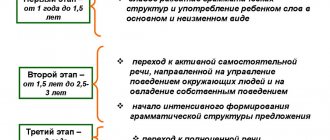Many people believe that tongue twisters only improve diction, but this is not true; they improve thinking, attention, and even reading speed.
To create neural connections and for brain development, it is very important to develop not only fine motor skills, but also the speech of a child or adult.
Motor exercises and correct speech increase the number of neural connections and accelerate the exchange of incoming information between the hemispheres.
Reliable strong fast neural pathways have a great impact on improving memory, attention, thinking development and reading speed.
Let's touch on the definition of the term
Before discussing the merits of tongue twisters, it is necessary to clearly define what kind of animal this is. This is a humorous (not always, but most often) work, usually rhymed (usually short, one or two lines, but there are longer versions), which contains difficult to pronounce words with repeated sounds. They need to be pronounced quickly and clearly, which is very difficult - this is the whole point of a tongue twister. As a rule, tongue twisters contain alliteration - the repetition of consonant sounds (up to a hundred years old, we grow old - an example of alliteration).
There are a lot of tongue twisters, and what’s more, they are constantly being modified. Old tongue twisters can be improved by supplementing or shortening them, changing words in places. Therefore, there can be a great many variants of the same tongue twisters.
Interesting facts about tongue twisters
Text exercises for improving speech come from ancient folklore. Then they were used for competitions between speakers or ordinary holiday games. Since then, some speech norms have changed, so new tongue twisters are created every year.
V. Dahl was the first person who paid attention to such a genre of folklore as the tongue twister. He introduced them into literary sources and tried to systematize them. Dahl was the one who explained the meaning of such seemingly meaningless proverbs. Moreover, in those days, tongue twisters were designed for adults, since their meaning was completely incomprehensible to children.
Who needs to speak clearly?
Regardless of whether a person has “porridge in his mouth” or not, he must have correct, clear and understandable speech, if his profession requires this. For example, a teacher or an announcer - they talk throughout the working day, and it is very important that they are understood correctly both at nine in the morning and at five in the evening.
This same category of people who earn their bread and butter with their language includes various kinds of artists, managers, sales agents, directors, businessmen, and so on. All of them simply need to have clear diction, which means they cannot do without tongue twisters for speech development.
Tongue twisters for classes
- To interpret clearly, but to no avail to re-interpret.
- And I have no time for feeling unwell.
- The pharaonic favorite was replaced by sapphire and jade.
- The puncture was recorded as a protocol.
- Buy a bale of bale.
To complete the exercise, take the easiest tongue twister: buy a kip of kip.
Practice this tongue twister for a whole week. Remember how many times you were able to recite the tongue twister on the first day and how many on the last. Compare your results. Then take a more difficult tongue twister.
Classes with tongue twisters will not take up a lot of your time, but they will provide you with many interesting minutes and will help develop memory, attention, thinking and increase reading speed. We wish you good luck.
Sounds with which problems occur most often
Oddly enough, this includes not only the sound “r”, with which a huge number of people really have a lot of difficulties. It is also very common to encounter difficulties with the pronunciation of the sounds “l”, hissing (as well as “z” and “s”). Some people confuse “n” and “m”, while others mumble paired consonant sounds (“b” - “p”, “v” - “f”, and so on). Each of these sounds has its own tongue twisters. So it is not at all necessary to train diction for everyone - you can find exactly what you need.
As an example of tongue twisters for speech development and pronunciation training, we can give the following couple of examples:
- We gave Lila a lily (we sharpen the “l”).
- Breathing noisily, six little frogs rustle (we sharpen the “sh”).
- Forty forty arrived on time (we sharpen the “s” and “r”) and so on.
— Tongue twister starting with the letter Ш
________
* * * Two puppies, cheek to cheek, nipping at the brush in the corner.
* * * Don’t look for us, Mom, We are looking for sorrel for cabbage soup.
* * * The goldfinch had a goldfinch.
* * * Tongs and pliers - these are our things.
* * * Chushka has bristles, pike has scales. Funny tongue twisters The mouse climbed under the lid, To gnaw the crumbs under the lid, The mouse is probably dead - The mouse forgot about the cat!
* * * Chickens, geese and turkeys pecked at the parsley, ate some quinoa, and ran for water.
* * * Skinny, weak Koschey drags a box of vegetables.
* * * Yasha and Pasha ate porridge, Sasha and Masha ate yogurt, and Mishutka ate a herring under his fur coat.
* * * It’s a hassle to catch a cunning magpie, And forty forty is forty hassle.
* * * Behind the village, near a country road, a quail was singing in a field. The quail flew in, the quail sang.
* * * The parrot said to the parrot: I will parrot you, parrot. The parrot answers him: Parrot, parrot, parrot!
* * * The ship was carrying caramel, the ship ran aground, and the sailors ate caramel aground for three weeks.
* * * Once upon a time I gave a crucian carp a coloring book. And Karas said: “Color the fairy tale, Little Karas!” On the coloring page of Little Kara - Three cheerful little pigs: Little Kara has repainted the piglets into little crucians!
Basic principles of speaking
It would be wrong to think that learning tongue twisters is easy and simple. You can’t “take it and read it”; here you also need to be patient, as in any other matter.
The first thing to do is to pronounce the tongue twister slowly and even preferably syllable by syllable, carefully articulating. It is important to ensure that each sound is pronounced clearly, cleanly and intelligibly. There is no need to rush here.
After carefully reading the tongue twister several times, you should learn it by heart - a person can do this even with a poor memory; the volume of tongue twisters is relatively small (especially if it is only one line). To make learning easier, you can use the so-called cheat sheets - with your hands: for example, bend your fingers for each word, or clench them into fists, or tap out the rhythm. This method is especially good for young children.
The second phase is to hone articulation. To do this, you will need an assistant and a supply of patience both on his part and on the part of the trainee himself. The assistant must be seated opposite you, and then over and over again slowly, clearly tell him the tongue twister - but without sound. This exercise must be performed until the assistant can read each letter on the lips without any problems and put the tongue twister together.
When you manage to recognize the phrase by your lips, you can move on to the next stage, even more difficult: pronouncing it in a whisper. Speech must be so clear that whispers are easily understood and audible. As an example, you can take the speech of a theatrical prompter - this is the one who hones his whisper to filigree clarity!
The next point is to increase the volume. Now the same thing needs to be done loudly and with expression. It’s like being in a literature class in school, reciting a poem assigned for home by heart.
And finally, the last stage is a change in intonation. The tongue twister, which has already been memorized by this moment, needs to be told in different ways: loudly and quietly, in a child’s voice and in an old man’s rattling, in a chant and recitative – there are a million intonations. The most important thing is that no matter how the tongue twister is pronounced for speech development, it should be done quickly. And, of course, without losing clarity.
Of course, you shouldn’t think that all this can be accomplished in one day. Diction training requires quite a lot of time and patience - it will take at least several weeks before something starts to work out. You need to devote at least thirty to forty minutes to this every day. The main thing is not to give up halfway. By the way, experts recommend that all these exercises be performed in motion - you can walk, run, do exercises, and so on, however, you will also have to monitor proper breathing.
Another important factor: in order for everything to work out correctly, you need to not just mechanically rattle off a memorized lesson, but imagine in your imagination everything that is described in the tongue twister. If we are talking about how “mom washed Mila,” you should paint this picture in your head as vividly as possible. Here mom is washing Mila, now she dropped the soap, now Mila is happy... Only then will it be possible to find the right intonations.
And finally, good advice: if you read books aloud, this will not only help develop correct, clear intonations and train diction, but will also develop phonemic awareness.
— Tongue twisters starting with the letter R
______
* * * There is grass in the yard, there is firewood on the grass. Don’t cut wood on the grass in the yard.
* * * Karl stole corals from Clara, Clara stole a clarinet from Karl.
* * * The crow missed the crow.
* * * The ships tacked, tacked, but did not tack.
* * * One, two, three, repeat: The enemy is not a friend, the legs have no hands...
* * * Three magpies chattered on the hill.
* * * Brother tells sister for three days. I'm having a holiday soon. Third birthday. Let's eat jam.
You might be interested in this article on how to develop your communication skills.
________
Tongue twisters for adults
It is necessary to understand that among pure talk there is a “hierarchy”. They are clearly divided into categories by age. Of course, among them there are many universal ones, but there are also those that are suitable only for adults - for example, because their content is vulgar in nature or they are simply very difficult for children to understand. One way or another, below are several examples of tongue twisters for the development of adult speech. One of them is perhaps the most famous - this is a tongue twister about round dancers and others from this pleasant company. It is remarkable in that, if desired, it can be continued indefinitely.
- One day I was scaring a jackdaw when I saw a parrot in the bushes. And that parrot says: “You scare the jackdaws, pop, scare them, but don’t you dare scare the jackdaws, pop, in the bushes.”
- A ruined caterpillar, a powdered compact. An intimidated button, a tangled mess, and so on.
Another tongue twister, which is suitable only for adults, since it is impossible for children to remember it by heart (and what can I say, it is difficult for adults to do this even with the most tenacious memory), is called “Liguria” and is rightfully considered the longest tongue twister. An abbreviated version is often used, but even in that version it takes up several paragraphs. The total length of this tongue twister, which tells the story of a Ligurian traffic controller, and which contains some shorter tongue twisters that have long been known to everyone, is about a page.
Tongue twisters - what are they?
A tongue twister is one or two or more sentences represented by confusing words/syllables that are difficult to pronounce. They should not be put on a par with rhyming proverbs. The latter are distinguished by the presence of a specific meaning, while tongue twisters are intended solely to improve diction and speech properties.
Quite often, tongue twisters for developing diction in adults sound funny. But it makes the classes much easier, making them fun and exciting.
- Beavers wander into the cheese forests. Beavers are brave, but they are kind to beavers.
- The emotional Varvara felt the emotion of the insensitive Vavila.
- The prosecutor used a hole punch to puncture the protocol.
It is advisable to use simple short tongue twisters to develop diction at first. As your speech improves, classes need to be made more difficult by practicing tongue twisters that are longer and more difficult to pronounce. They help to work through several – about three to five – problematic sounds in pronunciation at once.
- The cat on the window waves to the midge.
- Kirill shaved his eyebrows with a razor.
- The quail flew before the quail.
Before starting classes, a person must give the most objective assessment of his speech. Each of the tongue twisters is designed to develop a specific sound. And before choosing, you need to analyze the conversation, identifying problematic sound combinations. With the help of correctly selected tongue twisters, you can improve your diction and solve difficulties with articulation and speech rate.
It is important to remember the following while practicing. If a person speaks quickly, “swallowing” some sounds, then tongue twisters at the stage of learning them should be voiced at a slow pace, clearly highlighting all phonemes.
Liguria is considered the most complex and longest tongue twister. It is a logical story, but it is composed exclusively of sentences that are difficult to pronounce. Used to correct and improve diction for professional speakers and announcers.
Tongue twisters for speech development for children
Pure sayings, suitable for children in their complexity and content, are nevertheless also “filtered.” Those that are suitable for three-year-olds may no longer be useful for seven-year-olds, and vice versa. When working with children, it is important to remember one simple rule: the child should not be bored. He should enjoy the activity, it should be interesting and fun for him. And if the baby is bored, difficult and incomprehensible, there is not enough joy here, and therefore there will not be much benefit either.
Therefore, when choosing children's tongue twisters for speech development, you should focus on the following criteria: the age of the baby (for the little ones, select the simplest and funniest ones, for those older - more complex ones) and those sounds that need to be trained. You shouldn’t give your child everything in a row, “just to study.” Tongue twisters for the development of children's speech and diction must be used wisely; the process must give the result desired not only by the parents, but also by the child himself.
When teaching children under six years old, you should select children's tongue twisters for speech development that train one specific sound - “s”, “sch”, “r” and so on. If your baby has problems pronouncing several sounds, it’s worth finding more different exercises for each of them, but you shouldn’t take ones that repeat two, three, and so on problem sounds at once. Such speaking tasks are well suited for the development of speech in children aged 7 years. Tongue twisters, by the way, are recommended to be introduced into a child’s vocabulary as early as possible - then he will quickly begin to understand various sound combinations and will be able to repeat them without any problems. In this case, by the age of seven, the child will have completely calmly mastered all the sounds of his native language.
The following demonstrates possible tongue twisters for speech development for children of senior preschool age.
- Prokop doesn't have dill.
- The pike has clean cheeks.
- The cat bought a mug with a stick for the cuckoo.
- The vaunted halva in the stable.
- Timur's yard is overgrown with grass and so on.
Courses for development
We also have interesting courses that will perfectly pump up your brain and improve your intelligence, memory, thinking, and concentration:
Speed reading in 30 days
Would you like to quickly read books, articles, newsletters, etc. that interest you? If your answer is “yes,” then our course will help you develop speed reading and synchronize both hemispheres of the brain.
With synchronized, joint work of both hemispheres, the brain begins to work many times faster, which opens up much more possibilities. Attention , concentration , speed of perception are enhanced many times over! Using the speed reading techniques from our course, you can kill two birds with one stone:
- Learn to read very quickly
- Improve attention and concentration, as they are extremely important when reading quickly
- Read a book a day and finish your work faster
Sign up for a courseFree lesson
We speed up mental arithmetic, NOT mental arithmetic
Secret and popular techniques and life hacks, suitable even for a child. From the course you will not only learn dozens of techniques for simplified and quick multiplication, addition, multiplication, division, and calculating percentages, but you will also practice them in special tasks and educational games! Mental arithmetic also requires a lot of attention and concentration, which are actively trained when solving interesting problems.
Sign up for a courseRead more
Secrets of brain fitness, training memory, attention, thinking, counting
If you want to speed up your brain, improve its functioning, improve your memory, attention, concentration, develop more creativity, perform exciting exercises, train in a playful way and solve interesting problems, then sign up! 30 days of powerful brain fitness are guaranteed to you:)
Sign up for a courseRead more
Development of memory and attention in a child 5-10 years old
The purpose of the course: to develop the child’s memory and attention so that it is easier for him to study at school, so that he can remember better.
After completing the course, the child will be able to:
- 2-5 times better to remember texts, faces, numbers, words
- Learn to remember for a longer period of time
- The speed of recalling the necessary information will increase
Sign up for a courseRead more
Super memory in 30 days
As soon as you sign up for this course, you will begin a powerful 30-day training in the development of super-memory and brain pumping.
Within 30 days after subscribing, you will receive interesting exercises and educational games in your email that you can apply in your life.
We will learn to remember everything that may be needed in work or personal life: learn to remember texts, sequences of words, numbers, images, events that happened during the day, week, month, and even road maps.
Sign up for a courseRead more
Money and the Millionaire Mindset
Why are there problems with money? In this course we will answer this question in detail, look deep into the problem, and consider our relationship with money from psychological, economic and emotional points of view. From the course you will learn what you need to do to solve all your financial problems, start saving money and invest it in the future.
Sign up for a courseRead more
Long and difficult
Complex tongue twisters for speech development are, as a rule, massive in volume, aimed at practicing several sound combinations at once and are difficult to reproduce. But that’s where the excitement lies! This is precisely why such tongue twisters attract and beckon for the development of speech at 6 years old, at 12 and at 20 - with equal force. One of the regularly encountered and used tongue twisters in this category can be considered a pure tongue twister about blackberries and blueberries (if you didn’t live near a blackberry, but if you lived near a blueberry, then blueberry jam is familiar to you, but blackberry jam is completely unusual. If you lived near blackberry, then your usual blackberry jam... and so on), as well as about apricot, coconut and others like them (no apricot, coconut, radish - and the like).
How to repeat tongue twisters correctly?
You choose any tongue twister, inhale as much air as possible and when you start exhaling the air, start speaking the tongue twister, repeating it until the air runs out.
Remember, the tongue twister is repeated only as you exhale; you cannot inhale additional air in order to complete the tongue twister.
Training tongue twisters a day can take no more than 5-10 minutes, the main thing is to do the exercise correctly.
To complete the exercise, you can choose your own tongue twister or use ours.
Possibility of independently compiling a complete speech
These expressions were then invented by the people so that everyone had the opportunity to compose them. This can easily be done during one very interesting game in a fun company. A minimum of four people is required. The players agree on a sound - for example, the sound "r" - with which all words in the future tongue twister will begin. And then the questions are written on the piece of paper: who (you need to write the name, nickname, nickname, etc.), what did, where, why (if the game is played with more people than four, you can use your imagination and come up with additional tasks).
Each of the players takes turns writing his answer to a question, wrapping the piece of paper so that no one can see what he has written, and passing it on. So the sheet might look something like this:
Roma/wolverine/child, roared a beluga/drove a steering wheel/worked as a robot, in Rome/at a rodeo/on a ranch, (because) he got up early/was born in a shirt/the cancer on the mountain did not whistle.
By combining these answers into phrases, you can get the most ridiculous tongue twisters, but they will nevertheless train the pronunciation of the sound “r”, and in addition, will greatly amuse their creators and their friends.
Types of tongue twisters
Tongue twisters can be grouped according to different criteria. But most often they are classified as follows.
Complex tongue twisters for adults
These are phrases with complex letter combinations. They practice three or more sounds. Or two, but in a very difficult combination.
- The emotional Varvara felt the emotion of the insensitive Vavila;
- Karl put the onion on the chest, Klara stole the onion from the chest;
- The queen had a gentleman. The gentleman had a queen. Who's the queen? And who is the gentleman?;
- Four men walked from near Kostroma, from near Kostromishchi. They talked about trading, and about purchases, about cereals, and about reinforcements;
- A beetle is buzzing over the honeysuckle, the casing is heavy on the beetle.
- Mom, don’t look for us, We pinch sorrel for cabbage soup.
- The cat lapped the milk, and Vitya dipped the bun in the milk.
- The cap is sewn, not in the Kolpakov style, the bell is poured, not in the Kolokolov style. It is necessary to re-cap, re-cap. The bell needs to be re-belled, re-belled.
The longest and most complex tongue twister in Russian is called “Liguria”. This tongue twister is widely used by announcers, actors and people in professions for whom clear, intelligible speech is important. Liguria is a combination of more than 40 tongue twisters in one. Speech therapists advise first learning to read this verse at a fast pace. And only then start learning it by heart.
Full text of Liguria with accents:
***
On Thursday the fourth, at four and a quarter o'clock, the Ligurian traffic controller was regulating in Liguria, but thirty-three ships tacked, tacked, and never tacked.
***
And then the protocol about the protocol, the protocol, recorded how the interviewed Ligurian traffic controller eloquently, but not purely reported, but did not additionally report, additionally reported, but so reported about the wet weather that so that the incident did not become a candidate for a judicial precedent, the Ligurian traffic controller acclimatized in the unconstitutional Constantinople, where the tufted little girls laughed and shouted to the Turk, who was smoked with a pipe:
***
Don’t smoke a pipe, Turk, you’d better buy a pile of peaks, you’d better buy a pile of peaks, otherwise a bombardier will come from Brandeburg and bombard you with bombs because someone black-nosed dug up half his yard with his snout, dug up and dug up!
***
But in reality the Turk was not in action.
***
Yes, and Klara the King was sneaking to the store at that time, while Karl was stealing corals from Klara, for which Klara stole the clarinet from Karl, and then in the yard of Varvara, the tar widow, these two thieves stole firewood. But sin is not laughter, not putting it in a nut. About Klara and Karl in the darkness, all the crayfish were noisy in a fight, so the thieves had no time for the bombardier, and no time for the tar widow, and no time for the tar children.
***
But the angry widow put the firewood in the barn: once firewood, two firewood, three firewood - all the firewood could not fit, and two woodcutter, two woodcutterOla-drovorUba, for the emotional Varvara, expelled the firewood across the width of the yard back to the woodyard, where the heron wasted away, the heron withered, the heron died.
***
The heron's chick clung tenaciously to the chain; well done against the sheep, and against the well done the sheep itself, to which Senya carries the hay in a sleigh, then Senka carries Sonya and Sanka on a sled: the sled hops, Senka sideways, Sonya head on, everyone goes into a snowdrift, and Sashka is just a bump in the head knocked down
***
Then Sasha went along the highway, Sasha found Sasha on the highway. Sonya - Sashka’s friend was walking along the highway and sucking a dryer, and besides, Sonya the turntable also had three cheesecakes in her mouth - exactly like a honey cake, but she had no time for a honey cake - Sonya, with cheesecakes in her mouth, the sexton over-spont, over-spont: buzzing like a ground beetle , buzzing and spinning.
***
Was at Frol's - Frol lied to Lavra, he will go to the Lavra to Frol Lavra, he will lie to him that - the Akhmister with the Akhmister, the Otmister with the Otmister, that the snake has a snake, and the hedgehog has a hedgehog, and a high-ranking guest took away his cane, and soon again five guys ate five honey mushrooms and a half-quarter of four lentils without worms, and one thousand six hundred and sixty-six pies with cottage cheese made from whey from yogurt.
***
The bells were ringing about everything about this, so much so that even Konstantin, a Salzburg unpromising man, stated from under an armored personnel carrier:
***
Just as you can’t ring all the bells, you can’t re-ring the bells, so you can’t speed up all the tongue twisters, you can’t over-speak; but trying is not torture.
Tongue twisters for children's speech development
Tongue twisters should be taught from childhood. Memorizing them forms correct pronunciation and develops beautiful speech in the child. Many children's tongue twisters convey funny and cheerful stories, which means they can be learned while playing. Much attention should be paid to cues aimed at practicing “problem” sounds.
- The mouse whispers to the mouse: “You keep rustling, you’re not sleeping.” The mouse whispers to the mouse:
“I’ll rustle more quietly”;
- The wasp does not have whiskers, not whiskers, but antennae;
- Six little mice rustle in the reeds;
- One firewood, two firewood, three firewood;
- White rams beat drums;
- From the clatter of hooves, dust flies across the field;
- A fisherman is catching a fish; the entire catch floats into the river.
- Good beavers go into the forests.
- Hedgehogs became friends with mice in the rye. They went into the reeds - and there were no souls in the rye.
- The snake was bitten by the snake, and you can’t get along with the snake.
- The baker baked the bagel, bagel, loaf and loaf from the dough early in the morning.
- There lived three chickens: Yak, Yak Tsydrak, Yak Tsydrak Tsydroni. Once upon a time there lived three chicks: Tsypa, Tsypa Drypa, Tsypa Drypa Lampomponi. Here Yak married on Tsypa, Yak Tsydrak on Tsypa Drypa, Yak Tsydrak Tsydroni on Tsypa Drypa Lampomponi. They had one son: Yak and Tsypa: Shah. Yak Tsydrak with Tsypa Drypa: Shah Sharakh. Yak Tsydrak Tsydroni with Tsypa Drypa Lampomponi: Shah Sharakh Sharoni.
- Letter A, letter A – Alphabet head. Vova knows, Sveta knows, And she looks like a rocket.
- Open, Varvara, the gates, if not the enemy is behind the gates, but the enemy and the enemy are turned away from the Varvara gates.
- A hedgehog lies by the Christmas tree, the hedgehog has needles, And below, looking like little hedgehogs, last year’s cones lie on the grass.
- Beavers go bravely into the forests, Beavers are kind to beavers.
- It will either rain or snow, it will either happen or it won’t.
- The hedgehog, the hedgehog, and the hedgehog, and the swift, the swift, and the little bear were frightened.
- The woman has beans, the grandfather has oaks.
- The water carrier was carrying water from the water supply.
- White snow. White chalk. White sugar is also white. But the squirrel is not white. It wasn't even white.
- The toad sat in the puddle, looking greedily at the beetle. The beetle buzzed, buzzed, buzzed and came to her for dinner.
Tongue twisters for announcers
One of the basic skills that an announcer or radio host must have is good diction. With the help of tongue twisters, you can significantly improve the quality of pronunciation and make your speech clearer. Often, before broadcasting, announcers read tongue twisters, warming up their articulatory apparatus. Many TV and radio presenters use Liguria for training. Absolutely any tongue twisters known to everyone will be suitable as a warm-up before the broadcast.
- A lilac, unpromising guy with an undercut.
- In the depths of the tundra, otters in gaiters poke cedar kernels into buckets! Having torn out the gaiters from an otter in the tundra, wipe the cedar kernels with the otter, wipe the otter's face with the gaiters - the otter into the tundra, the kernels into the buckets!
- The ships tacked, tacked, but didn’t tack, because they didn’t believe in the possibility of tackling. Here are the people of little faith: if they believed, they would catch it.
- Tongue twisters I speak quickly, I do not speak quickly with tongue twisters.
Short tongue twisters
As mentioned earlier, it is better to start developing diction with the help of tongue twisters with short, simple phrases. At the initial stage, they may consist of one word, for example, “unpromising”, “repack”. Replies consisting of several words must be pronounced in one breath.
- The messenger from the galleys was burned;
- The falcon sat on the naked trunk;
- The Christmas tree has pinched needles;
- Cannons were being lowered from the hills and rocks;
- The quail hid the quails from the boys;
- The Queen gave the gentleman a caravel.
Long tongue twisters
After short remarks begin to come out easily and naturally, you should start working on longer tongue twisters. Large phrases are also pronounced in one breath. It is allowed to pause to take in air between quatrains.
- King Clarik has a king, Queen Carlisle has a dwarf. The dwarf is Karl, and the king is Clara. Clara has a clarinet, Karl has corals. Clara stole corals from Karl, and Karl stole Clara's clarinet. Clara doesn't have a clarinet, but she does have corals. Karl has a clarinet, but no corals. Queen Carlisle punished Clara for stealing corals from the dwarf Karl, and Clarik the king of Karl punished the one who stole the clarinet from the thief. If Karl had not stolen from Clara, Clara would not have stolen the corals, Clarik would have listened to his clarinet as he stole, and Karl gave the corals to Carlisle.
- The commander spoke about the colonel and about the colonel, about the lieutenant colonel and about the lieutenant colonel, about the lieutenant and about the lieutenant, about the second lieutenant and about the second lieutenant, about the ensign and about the ensign, about the ensign, but said nothing about the ensign.
Funny tongue twisters
This is a variation of complex tongue twisters with a comical meaning. Try to convey this with intonation.
For a fun feast:
“The vodka plays and sparkles in the glass. It pleases the soul and warms the womb. If vodka interferes with studying, give it up, such studies!”
For corporate competitions
“Getting used to work,
the worker accumulates work,
earnings are earned from work,
and additional earnings come from processing.”
***
“Our trains are the biggest trains in the world, and no big trains can beat our big trains in terms of traininess!”
To set the mood
“Watermelons were being reloaded from truck to truck. During a thunderstorm, the body fell apart in the mud from a load of watermelons.”
***
“Senya is carrying Sanya and Sonya in a sled. Sleigh hop! Senya - from the feet, Sanya - to the side, Sonya - to the forehead. Everything is in a snowdrift - bang!
***
“I smoked a Turkish pipe, I pecked at the trigger of the grain. Don’t smoke, Turk, pipes, don’t peck, trigger, grains!”
For noisy parties
“Skinny, weak Koschey is dragging a box of vegetables.”
***
"They threw bananas at the funny monkey; they threw bananas at the funny monkey."
***
“Managed to sleep through the opportunity to get laid.”
Vulgar tongue twisters
“Shura Semashko groped Natasha, And the orderly Negoshin killed the tambourine.”
***
“They took off Nadezhda’s colored clothes, Without clothes, Nadezhda does not attract as before.”
***
“When you arrive in Tahiti, don’t hide it, aunts, titis. There is no reason for the aunts to hide in Tahiti. There, aunties are held in high esteem, so titi for aunties comes in handy. To become one of your own in Tahiti, don’t hide it, auntie, to become one. Rip everything off, don’t languish, for intercourse in Tahiti.”
Interesting facts about tongue twisters
- In Rus' they have been known since ancient times. Then they were used in oratory, and only later children began to practice tongue twisters.
- Vladimir Dal was the first to study pure tongues.
- Tongue twisters belong to a genre such as folklore. In other words, this is oral folk art.
- Another name for tongue twisters is tongue twisters (not currently used).
- Vladimir Dal called tongue twisters pure stories.
Tongue twisters for speech development are useful for everyone, regardless of age or presence of speech problems. They improve diction, develop hearing, and strengthen thinking. We can safely say: speaking lessons are not only useful, but also interesting!
— Tongue twister starting with the letter Sh
______
* * * Here’s a huge one hissing: “It’s very stuffy.” I'd like to take a shower. You need to lie in the shower so that it doesn’t feel so stuffy.
* * * Old talkative women live in a hut at the edge of the forest. Every old lady has a basket, There is a cat in every basket, Cats in baskets sew boots for old ladies.
* * * Yegor walked through the yard carrying an ax to repair the fence
* * * Sasha sewed a hat for Sashka, Sashka knocked off a bump with his hat.
* * * Sasha walked along the highway and sucked on a dryer.
* * * Masha sewed a fur coat, a hat and pants for the monkey.
* * * When I'm in a hurry, I eat noodles. I'll finish the noodles and hurry. I'm in a hurry. Noodle noodles. Well, I'll make everyone laugh again.
_______
Reviews and comments
You can leave a comment or review, or share tongue twisters below.
We also recommend reading:
- Storytelling
- How to teach a child to read: rules, tips and tricks
- Development of speech culture
- 20 interesting facts about the Russian language
- George Orwell's 5 Rules for Those Who Want to Learn to Write
- How acting skills help in everyday life
- How to teach a child to pronounce the sound “R”
- Oratory: exercises
- Meditation with mantras
- Top 5 most important soft skills for every child
- Difficult words in Russian: overcoming difficulties together
Key words:1Rhetoric











